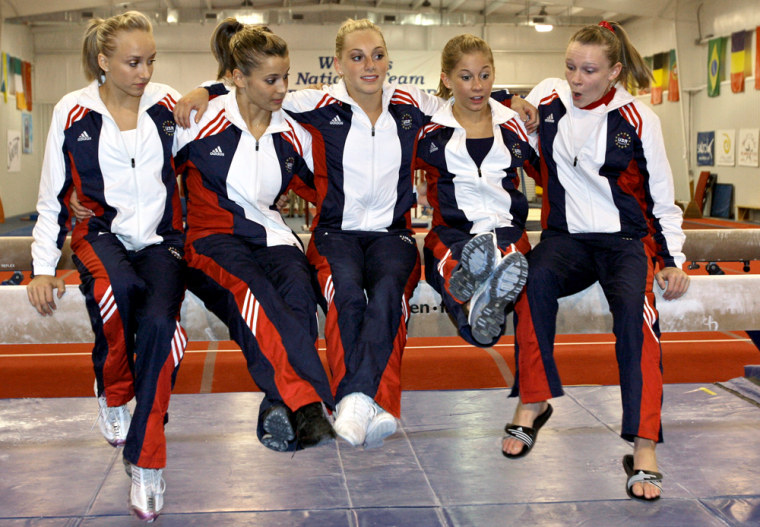They’re blonde, they’re tiny, they’re cuter than a 2-year-old with a puppy. And they’ve got bull’s eyes on their backs.
And that’s just fine with the U.S. Women’s Gymnastics Team, as tough and confident a group of athletes as the United States has sent to the Olympics since the original Dream Team. Don’t be fooled by the Miss America smiles and pony tails. These women are here for one reason only: to show the rest of the world — including the host Chinese — what real champions are made of.
They’re led by 16-year-old Shawn Johnson, the reigning world champion and the possessor of more bring-it-on attitude than you should be able to fit in a package that measures just 4 feet, feet, 8 inches and nudges the scales to nearly 84 pounds.
“I think it will be 1-2-3, red, white and blue on the podium,” she told Today Show co-host Meredith Vieira before the team came to Beijing earlier this week. It’s a statement she’s not backing down from, not even with the Chinese team, which hopes to dethrone the Americans on their home turf, reading and listening to her comments.
“I like their confident attitude,” said team official Marta Karolyi. “I think that’s one of the most important ingredients.”
“We are the reigning world champions,” 17-year-old Samantha Peszek replied when asked about the team’s ‘tude. “We’ve been training four years for this. We are just confident in ourselves and in our training.”
In other words, “We’re good and we don’t mind saying it.”
It hasn’t always been this way. In the heyday of the Warsaw Pact, the Soviet Union and Romania ruled the gymnastics world, and the women from the United States could only dream of being allowed to work out in the same gym with them.
Mary Lou Retton gave the sport a boost in her homeland when she hit her perfect 10, brought home the gold and took up residence on a Wheaties box in 1984. But everybody in the sport knew that as great as Mary Lou was, she hadn’t beaten the Soviets, who stayed home from the Games out of spite at the Americans, who had boycotted the Moscow Games in 1980.
Once all the nations of the world got back on board the good ship IOC, the United States women went back to their accustomed berths on the tourist deck. They weren’t sailing steerage, but they weren’t in the first-class cabins, either. And when they came to a new Olympic venue, they talked about how they were going to try with all their might to win a medal of any kind. They had some terrific individual performers — Shannon Miller remains one of the all-time great American gymnasts — but they didn’t have a world champion-level team.
It all changed in 1996 in Atlanta when a team known as the Magnificent 7 and a tiny bundle of grit and guts named Kerri Strug won the team gold medal.
All over America, little girls watched Strug nail her heroic vault on one leg, the other one too mangled to support her weight. Peszek was one of them, and the then-5-year-old says she played that tape constantly for two years until it snapped and unspooled. As she watched, she mimicked the moves she was seeing, imagining herself standing on the top step, an Olympic champion.
And now she’s here, and her eyes sparkle at the thought of what’s ahead this week in the most glamorous competition the Summer Games provide.
She and her teammates have trained twice a day for years to get here. They’ve soldiered on through sprains, strains, stress fractures. They’ve watched rivals and teammates snap bones and tendons and fall by the wayside. They’ve gone into arenas in which the crowds were screaming at them to fall.
Their confidence isn’t wishful thinking. It’s been forged in the heat of battle. They may look like pixies, but they are pixies who will bite your head off.
“We are not overconfident,” said Bridget Sloan, who was 4 when the Mag 7 convinced this team that Americans could rule the world on beam and bars and floor and vault. “We know people are gunning for us, but we know our strengths. We know what we have to do. We have the strength, we have the skills, we have the team.”
